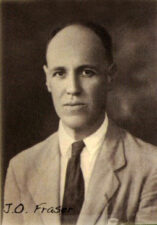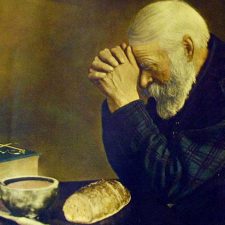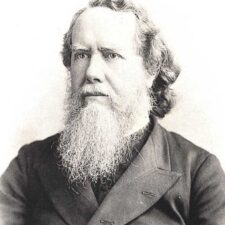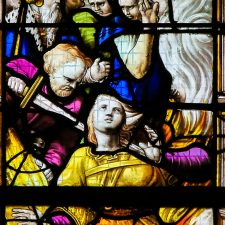October 9, 1915.
My dear Friends,
The Scriptures speak of several kinds of prayer. There is intercession and there is supplication, there is labour in prayer and there is the prayer of faith; all perhaps the same fundamentally, but they present various aspects of this great and wonderful theme. It would not be unprofitable to study the differences between these various scriptural terms….
Speaking generally, however, there is a distinction we all know; it is the distinction between general prayer and definite prayer. By definite prayer I mean prayer after the pattern of Matt. xxi. 21, 22 ; John xv. 7, etc., where a definite petition is offered up and definite faith exercised for its fulfillment. Now faith must be in exercise in the other kind of prayer also, when we pray for many and varied things without knowing the will of God in every case. I may pray much in this general way, for instance, about the European War, but I cannot offer much definite prayer, as I do not know the purposes of God sufficiently well to do so.
In general prayer I am limited by my ignorance. But this kind of prayer is the duty of us all (i Timothy ii. i, 2) however vague it has to be. I may know very little, in detail, about the object of my prayer, but I can at any rate commend it to God and leave it with Him. It is good and right to pray, vaguely, for all people, all lands, all things, at all times. But definite prayer is a very different matter. It is in a special sense ‘ the prayer of faith ‘. A definite request is made in definite faith for a definite answer. Let me pass on to you a few thoughts that have been in my mind the last few days on the subject of the PRAYER OF FAITH.
Take the case of a Canadian emigrant as an illustration. Allured by the prospect of golden grain he leaves England for the Canadian West. He has a definite object in view. He knows very well what he is going for, and that is wheat.
He thinks of the good crops he will reap and of the money they will bring him-much like the child of God who sets out to pray the prayer of faith. He has his definite object too. It may be the conversion of a son or daughter; it may be power in Christian service; it may be guidance in a perplexing situation, or a hundred and one other things- but it is definite. To consider the points of resemblance between the cases of the prospective Canadian farmer and the believing Christian:
1. THE BREADTH OF THE TERRITORY
Think of the unlimited scope for the farmer in Canada. There are literally millions of acres waiting to be cultivated. No need, there, to tread on other people’s toes! Room for all-vast tracts of unoccupied land just going to waste, and good land too. And so it is with us, surely. There is a vast, vast field for us to go up and claim in faith. There is enough sin, enough sorrow, enough of the blighting influence of Satan in the world to absorb all our prayers of faith, and a hundred times as many more. ‘ There remaineth yet very much land to be possessed.’
2. GOVERNMENT ENCOURAGES EMIGRATION
Think also of the efforts the Canadian Government are making to encourage emigration. All the unoccupied land belongs to it, but settlers are so badly needed that they are offered every inducement-emigration offices established, sea-passages and railway fares reduced and grants of land made free! And God is no less urgently inviting His people to pray the prayer of faith; ‘ASK-ASK-ASK’-He is continually saying to us. He offers His inducement too: ‘Ask and ye shall receive, that your joy may be full.’ All the unoccupied territory of faith belongs to Him. And He bids us to come and occupy freely. ‘How long are ye slack to go in to possess the land?’
3. FIXED LIMITS
Yet this aspect of the truth must not be over-emphasized. Blessed fact though it be that the land is so broad, it can easily be magnified out of due proportion. The important thing is, not the vastness of the territory, but how much of it is actually assigned to us? The Canadian Government will make a grant of 160 acres to the farmer-emigrant, and no more. Why no more? Because they know very well that he cannot work any more. If they were to give him 160 square miles instead of 160 acres he would not know what to do with it all. So they wisely limit him to an amount of land equal to his resources.
And it is much the same with us when praying the prayer of definite faith. The very word ‘definite’ means ‘with fixed limits’. We are often exhorted, and with reason, to ask great things of God. Yet there is a balance in all things, and we may go too far in this direction. It is possible ‘to bite off’, even in prayer, ‘more than we can chew’. There is a principle underlying 2 Cor. x. 13 which may apply to this very matter (see R.V. margin). Faith is like muscle which grows stronger and stronger with use, rather than India rubber which can be stretched to almost any desired length. Overstrained faith is not pure faith, there is a mixture of the carnal element in it. There is no strain in the ‘rest of faith’. It asks for definite blessing as God may lead; it does not hold back through carnal timidity, nor press ahead too far through carnal eagerness.
In my own case here (at Tantsah) I have definitely asked the Lord for several hundred families of Lisu believers. There are upwards of two thousand Lisu families in the district altogether. It might be said, ‘Why do you not ask for a thousand? ‘ I answer quite frankly, because I have not faith for a thousand. I have faith-or I would rather say I believe the Lord has given me faith-for more than one hundred families, but not for a thousand. So I accept the limits the Lord has, I believe, given me. Perhaps God will give me a thousand; perhaps, too, He will lead me to commit myself to this definite prayer of faith later on.
Someone has said that the Lord promises us bread, but He gives us bread and butter. This is in accordance with Eph. iii. 20: ‘Above all that we ask or think.’ But we must not overload faith: we must be sane and practical. Let us not claim too little in faith, but let us not claim too much either. Remember the Canadian emigrant’s 160 acres. Consider, too, how the Dominion Government exercises authority in the matter of location. The Government has a say as to the where as well as the how much of the emigrant’s claim. He may not wander all over the prairie at his own sweet will, and elect to settle down in any place he chooses. Even in regard to the position of his farm he must consult the Government.
Do we always do this in our prayers and claims? Do we consult the Heavenly Government at the outset, or do we pray ‘the first thing that comes?’ Do we spend much time waiting upon God to know His will, before attempting to embark on His promises? That this is a principle upon which God works, He has informed us very plainly, in i John v. 14, 15. I cannot but feel that this is a cause (not the only cause) of many unanswered prayers. Jas. iv. 3 has a broad application, and we need to search our hearts in its light. I read a testimony of Dr. Stuart Holden’s, not long ago, in which he said that one of the greatest blessings of his life had been his unanswered prayers. And I can say the same in my measure. Unanswered prayers have taught me to seek the Lord’s will instead of my own. I suppose we have most of us had such experiences. We have prayed and prayed and prayed, and no answer has come. The heavens above us have been as brass. Yea, blessed brass, if it has taught us to sink a little more of this ever-present self of ours into the Cross of Christ. Sometimes our petition has been such a good one, to all appearances, but that does not insure it being of God. Many ‘good desires’ proceed from our uncrucified selves. Scripture and experience certainly agree that those who live nearest to God are the most likely to know His will. We are called to be ‘filled with the knowledge of His will’ (Col. i. 9). The ‘secret of the Lord is with them that fear Him; and He will show them His covenant’. We need to know more of the fellowship of Christ’s death. We need to feed on the Word of God more than we do. We need more holiness, more prayer. We shall not, then, be in so much danger of mistaking His will.
The wonderful promise of John xv. 7 is prefixed by a far reaching ‘if’. I wonder if that verse might not be paraphrased: ‘If ye abide NOT in Me and My words abide NOT in you, DO NOT ask whatsoever ye will (for) it shall NOT be done unto you.’ Perhaps if we examined ourselves more thoroughly before God we might even discover, in some cases, that the whole course of our life was not in accordance with His will. What right would a man have, in such a case, to expect his prayers to be answered? But is not this the fact with regard to much ‘good Christian work?’ ‘Get your work from God’ is a needed injunction. How often Christian leaders make their own plans, work hard at them, and then earnestly ask God’s blessing on them. How much better, as Hudson Taylor felt, to wait on God to know His plans before commencing! Much Christian work seems to have the stamp of the carnal upon it. It may be ‘good’ it may be successful outwardly-but the Shekinah Glory is not there.
Now all this applies to the prayer of faith. We must have the assurance that we are in the right place, doing the right work. We must be sure that God is leading us, when we enter upon specific prayer. It does not follow that because a thing is the will of God, He will necessarily lead you to pray for it. He may have other burdens for you. We must get our prayers from God., and pray to know His will. It may take time. God was dealing with Hudson Taylor for fifteen years before He laid upon him the burden of definite prayer for the foundation of the China Inland Mission. God is not in a hurry. He cannot do things with us until we are trained and ready for them. Let us ‘press on’ then (Phil. iii. 12).
We may be certain He has further service, further burdens
of faith and prayer to give us when we are ready for them. And He will lead. Abraham would never have been a pattern of faith, if he had remained in Ur of the Chaldees. Nor will we ever have a faith worth calling faith unless we press forward in the footsteps of Him Who said, ‘Follow Me’.
4. THE CLAIM ENDORSED
Turn to the emigrant again. He has come to an agreement with the Canadian Government. He falls in with their terms; he accepts their conditions; he agrees to take over the land allotted to him. So he presents his claim at the proper quarter, and it is at once endorsed. Could anything be simpler? Nor need our claim in the presence of God be any less simple. When we once have the deep, calm assurance of His will in the matter, we put in our claim, just as a child before his father. A simple request and nothing more. No cringing, no beseeching, no tears, no wrestling. No second asking either. The parable of the unjust judge was never meant to teach that we are to wring an answer by main force from an unwilling God. One real asking is enough for a life-time.
In my case I prayed continually for the Tengyueh Lisu for over four years, asking many times that several hundreds of families might be turned to God. This was only general prayer, however. God was dealing with me in the meantime. (Of course I do not mean to suggest that anyone else would necessarily be led along just the same line. Does God ever deal with two different people in exactly the same way?) Then near the end of November last year (1914) when staying ‘with Mr. and Mrs. Geis down at Myitkyina in Burma, this same petition came to me as a definite burden. You know how a child is sometimes rebuked by his parents for asking something in a wrong way-perhaps in the case of a child, for asking rudely. The parent will say, ‘ Ask me properly ‘. That is just what God seemed to be saying to me then: ‘Ask Me properly.’ As much as to say, ‘You have been asking Me to do this for the last four years without ever really believing that I would do it: now ask IN FAITH.’
I recognized the burden clearly. And it was an actual burden: it burdened me. I went to my room alone one afternoon and knelt in prayer. I knew that the time had come for the prayer of faith. And then, fully knowing what I was doing and what it might cost me, I definitely committed myself to this petition in faith. I ‘cast my burden upon the Lord’ I rose from my knees with the deep, restful conviction that I had already received the answer. The transaction was done. And since then (nearly a year ago now) I have never had anything but peace and joy (when in touch with God) in holding to the ground already claimed and taken. I have never repeated the request and never will: there is no need. The asking, the taking and the receiving, occupy but a few moments (Mark xi. 24). The past can never be undone, never need be redone. It is a solemn thing to enter into a faith-covenant with God. It is binding on both parties. You lift up your hand to God, perhaps even literally ; you definitely ask for and definitely receive His proffered gift; then do not go back on your faith, even if you live to be a hundred.
5. GET TO WORK
To return once more to the Canadian farmer. He has put in his claim; the land has been granted; the deed made out and sealed with the Official seal. Is that the end then? No! only the beginning!
He has not attained his object yet. His object is a harvest of wheat, not a patch of waste land; and there is a vast difference between the two. The Government never promised him sacks of flour all ready for exportation-only the land which could be made to yield them. Now is the time for him to roll up his sleeves and get to work. He must build his homestead, get his live stock, call in labourers, clear the ground, plough it and sow his seed. The Government says to him in effect, ‘We have granted your claim: now go and work it.’
And this distinction is no less clear in the spiritual realm. God gives us the ground in answer to the prayer of faith, but not the harvest. That must be worked for in co-operation with Him. Faith must be followed up by works, prayer-works. Salvation is of grace, but it must be worked out (Phil. ii. 12) if it is to become ours. And the prayer of faith is just the same. It is given to us by free grace, but it will never be ours till we follow it up, work it out. ‘Faith and works’ again. They must never be divorced; for indolence will reap no harvest in the spiritual world. I think the principle will be found to hold in any case where the prayer of faith is offered, but there is no doubt that it always holds good in cases where the strongholds of Satan are attacked, where the prey is to be wrested from the strong.
Think of the children of Israel under Joshua: God had given them the land of Canaan-given it to them (notice) by free grace-but see how they had to fight when once they commenced actually to take possession! Then again think of Daniel (Daniel x. 12, 13): his prayer was answered the very first day he offered it; but that was only the signal for a twenty days’ battle in the aerial heavens! Satan’s tactics seem to be as follows. He will first of all oppose our breaking through to the place of a real, living faith, by all means in his power. He detests the prayer of faith, for it is an authoritative ‘notice to quit’ He does not so much mind rambling, carnal prayers, for they do not hurt him much.
This is why it is so difficult to attain to a definite faith in God for a definite object. We often have to strive and wrestle in prayer (Eph. vi. 10, etc.) before we attain this quiet, restful faith. And until we break right through and join hands with God we have not attained to real faith at all.
Faith is a gift of God (Rom. xii. 9); -if we stop short of it we are using mere fleshly energy or will-power, weapons of no value in this warfare. However, once we attain to a real faith, all the forces of hell are impotent to annul it. What then? They retire and muster their forces on this plot of ground which God has pledged Himself to give us, and contest every inch of it. The real battle begins when the prayer of faith has been offered. But, praise the Lord! we are on the winning side. Let us read and re-read the tenth chapter of Joshua, and never talk about defeat again. Defeat, indeed! No, Victory! Victory! Victory!
2 Sam. xxiil. 8-23 is a passage along this line which has been meat and drink to me the last day or two. Verses 11 and 12 contain all I have been saying in a nutshell. Please read them. Let Shammah represent the Christian warrior. Let David represent the crucified and risen Christ–and note that Shammah was ‘one of the mighty men whom David had’. Let the ‘plot of ground’ represent the prayer of faith. Let the lentils, if you will, represent the poor lost souls of men. Let the Philistines represent the aerial hosts of wickedness. Let ‘the people’ represent Christians (may be good people) afflicted with spiritual anaemia. I can imagine what these people were saying as they saw the Philistines approaching and ran away: ‘Perhaps it was not the Lord’s will to grant us that plot of ground. We must submit to the will of God.’
Yes, we must indeed submit ourselves to God, but we must ‘resist the devil’ too (Jas. iv. 7). The fact that the enemy comes upon us in force is no proof that we are out of the line of God’s will. The constant prefixing of ‘if it be Thy will’ to our prayers is often a mere subterfuge of unbelief. True submission to God is not inconsistent with virility and boldness. Notice what Shammah did-simply held his ground. He was not seeking more worlds to conquer at that moment! He just stood where he was and hit out, right and left. Notice also the result of his action and to whom the glory is ascribed!
6. PRAYING THROUGH TO VICTORY
I repeat that this does not necessarily apply to every kind of prayer. A young Lisu Christian here is fond of telling an experience of his a few months ago. He was walking through the fields in the evening when his inside began unaccountably to pain him. He dropped on his knees and, bowing his head down to the ground, asked Jesus to cure him. At once the stomach-ache left him. Praise the Lord! And there are no doubt multitudes of such cases-simple faith and simple answers. But we must not rest content with such prayer. We must get beyond stomach-ache or any other ache, and enter into the deeper fellowship of God’s purposes. ‘That ye be no longer children’ (Eph. iv. 14). We must press on to maturity. We must attain to ‘the measure of the stature of the fulness of Christ’, and not remain in God’s kindergarten indefinitely. If we grow into manhood in the spiritual life we shall not escape conflict. As long as Eph. vi. 10-18 remains in the Bible, we must be prepared for serious warfare-‘And having done all, to stand’ We must fight through, and then stand victorious on the battle-field.
Is not this another secret of many unanswered prayers-that they are not fought through? If the result is not seen as soon as expected, Christians are apt to lose heart, and if it is still longer delayed to abandon it altogether. You know the name they give to places in England when the building (or whatever it is) is abandoned when only half completed-So and so’s ‘Folly’ I wonder whether some of our prayers do not deserve the same stigma. Think of Wembley Tower: I have never examined it closely, but from a distance it looks as if a good beginning had been made. Luke xiv. 28-30 applies to prayers as well as towers. We must count the cost before praying the prayer of faith. We must be willing to pay the price. We must mean business. We must set ourselves to ‘see things through’ (Eph. vi. 18, ‘In all perseverance’). Our natural strength will fail: and herein lies the necessity for a divinely-given faith. We can then rest back in the Everlasting Arms and renew our strength continually. We can then rest as well as wrestle. In this conflict-prayer, after the definite exercise of faith, there is no need to ask the same thing again and again. It seems to me inconsistent to do so. Under these circumstances, I would say let prayer take the following forms:
(a) A firm standing on God-given ground, and a constant assertion of faith and claiming of victory. It is helpful, I find, to repeat passages of Scripture applicable to the subject. Let faith be continually strengthened and fed from its proper source-the Word of God.
(b) A definite fighting and resisting of Satan’s host in the Name of Christ. I like to read passages of Scripture, such as i John iii. 8, or Rev. xii. 111 in prayer, as direct weapon against Satan. I often find it a means of much added strength and liberty in prayer to fight in this way. Nothing cuts like the word of the living God (Eph. vi. 17, Heb. iv. 12).
(c) Praying through every aspect of the matter in detail. In the case of my Lisu work here I continually pray to God to give me fresh knowledge of His will, more wisdom in dealing with the people, knowledge of how to pray, how to maintain victory, how to instruct the people in the Gospel, or in singing or in prayer, help in studying the language, help in ordinary conversation, help in preaching, guidance as to settling down somewhere as a centre, guidance about building a house (if necessary), guidance as regards my own arrangements (servant, money, food, clothes, etc.) help and blessing in my correspondence, opening for the Word and blessing in other villages, for leaders and helpers to be raised up for me, for each of the Christians by name, also for every one of my prayer helpers by name. Such detailed prayer is exhausting, but I believe effectual in regard to ascertaining the will of God and obtaining His highest blessing.
I would not ask anyone to join me in the definite prayer for the turning to God of several hundred Lisu families, unless God gives individual guidance to do so. Better offer prayer in a more general way than make a definite petition apart from His leading. I should, however, value highly the prayer-co-operation of any who felt led to join me in it. What I want, too, is not just an occasional mention of my work and its needs before the Lord, during the morning or evening devotions, but a definite time (say half an hour or so?) set apart for the purpose every day, either during the day-time or in the evening. Can you give that time to me-or rather to the Lord?
About a fortnight ago I baptized two Lisu women at the little village of Six Family Hollow-the wives of the two young Lisu men I baptized last January. I have now baptized six Christian Lisu altogether, all from that one family. It was my painful duty only the next day, however, to exclude one of these, a man named Ahdo, from church fellowship, for an indefinite period. He is the man who first introduced me to the Lisu in his home and in many of the surrounding villages, and until the end of last year he acted as my preacher and ‘helper’ when with me. It appears that he has been continually, during the past few years and until now-not only in his own village but in other places where he has been with me-breaking the seventh commandment.
The Lisu are a very immoral race in any case, but in spite of his Christian profession he has been even more sinful than most of them. Such things will go on sometimes, almost indefinitely, no one butt the foreign missionary being ignorant of them. I had made inquiries about his character, but had not learnt anything. I baptized him with his younger brother and both parents last January, but he has not been with me since then. I am glad to say, however, that he seems quite penitent and never attempted to deny it. We must pray for his restoration. I have no other special news of the work, just now. I am thinking of visiting that village (Six Family Hollow) again in a few days, as well as other villages.
Hoping to write again next month and with earnest prayers for you all,
Yours in the Lord’s service,
J. O. Fraser.
 Republished exactly from Christian-Truth-Ministry.com. James Outram Fraser (1886–1938) was a British Protestant Christian missionary to China with the China Inland Mission. He pioneered work among the Lisu people, of Southwestern China, in the early part of the 20th century. He is credited with the Fraser alphabet for their language.
Republished exactly from Christian-Truth-Ministry.com. James Outram Fraser (1886–1938) was a British Protestant Christian missionary to China with the China Inland Mission. He pioneered work among the Lisu people, of Southwestern China, in the early part of the 20th century. He is credited with the Fraser alphabet for their language.













